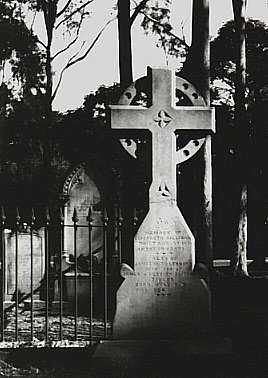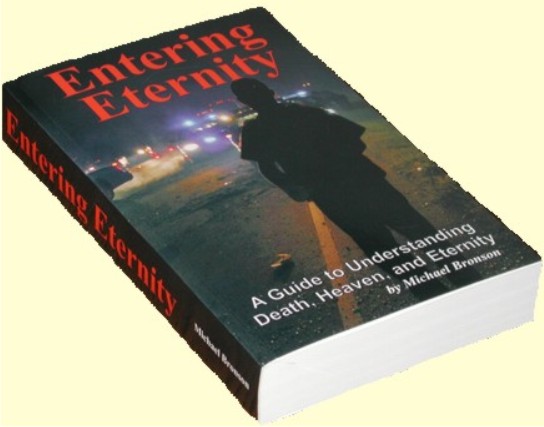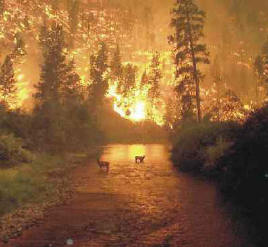






| Website Stats |
Visits from over |
|
Free downloads |
You can now read the material from this website on most electronic devices: -On your computer
Two NEW books from the author of BibleHelp
|
Fear of Death
Back

Chapter: 4.02
(Section 4: Fear, Death, and the Fear of Death)
Copyright © Michael Bronson 1997, 1999, and 2000
BibleHelp.org
Summary
Death is the greatest mystery of all and it has caused many people to fear its inescapable grip. Should death be feared? Read this chapter to find out.
Click Here for a book version of this material
NEW The eBook version of the book |
The fear of death is a universal phenomenon. No matter where you go in the world, you will always find large numbers of people who are afraid of dying. The reason for fearing death is obvious: Death is the greatest mystery of all.
As mentioned in the previous chapter (Fear, the Predator of our Peace), fear of the unknown is incredibly powerful. Since death is considered the biggest "unknown" of all, many people, including some Christians, find death terrifying.
Death is surrounded by so many unknown variables. What will it feel like when you die? What will be waiting for us when we reach the other side of the veil of death? Will the afterlife be as chaotic and painful as this life? Since we have never died before, we don’t know what to expect.
Death, like taxes, is unavoidable. There is no way to escape its grip. It doesn’t matter if you are rich, powerful, or influential; you will still die. Death is no respecter of persons.
Another reason many people find death so terrifying is the fact we have to face it alone. Even if you are surrounded by hundreds of people when you die, you must still pass through death by yourself. This prospect is very unnerving for many people.
Although passing into a vast unknown by yourself can be frightful, the thought of standing before God Almighty can be downright terrifying. God has installed in all of us a conscience with a knowledge of right and wrong. People inherently know they will have to stand before God someday and give an account for their actions. This can be a terrifying prospect for some people.
Some people deal with the issue of their mortality by becoming consumed and obsessed with the subject of death. Others, however, simply ignore the subject completely. Since there are plenty of distractions out there, ignoring death can be easy. The only time these people think about death is when they become seriously ill, someone close to them dies, or there is a major calamity. After the World Trade Center attack, for example, there was a large number of people searching the Internet for websites dealing with the subject of death.
Neither approach (being obsessed with death or ignoring it) is appropriate. Being obsessed with death is obviously unhealthy and ignoring death can have tremendous eternal consequences. A balanced approach is needed. A person needs to appropriately deal with the issues of death and then move on. The three main fears a person needs to address are:
Jonathan Edward’s historic sermon, "Sinners in the Hands of an Angry God" dealt with the consequences of facing God Almighty unprepared. Jonathan Edward pointed out that a person should be terrified of the prospects of standing before God Almighty if he has not appropriately taken care of his sin problem. Fortunately, God has provided us a solution. The section Understanding Salvation explains how a person can make peace with God.
Although making peace with God eliminates the fear of meeting God, it doesn’t eliminate the mystery of death itself. Death is still an unknown commodity. We still don’t know any of the specifics of what will happen at the time of our death. Yet, we can now have the confidence that things will be okay. We can have the confidence that the God who cares for us will work out all of the details.
Even though I walk through the valley of death, |
Of course, simply knowing intellectually that we shouldn’t fear the unknown doesn’t mean we will automatically have peace. We must learn to trust God. We must act upon the promises of God set forth in the Bible. The previous chapter (Fear, the Predator of our Peace) deals with this issue.
Even though we know God will work out the details, it would still be nice if we didn’t have to face death alone. We are social creatures and being "alone" during such a monumental time can cause apprehension and panic. In reality, a Christian does not die alone. The name Immanuel (Isaiah 7:14) means "God with us." Therefore, just as God is with us before we die, He will be with us during and after our death. The next chapter (Victory Over the Sting of Death) provides an excellent example of God’s sufficiency and presence during the death of a Christian.
What is death like for the Christian? Is the dying process always peaceful or are there occasions when the Christian has doubts and fears? It varies, of course, from person to person. As Christians, we have the assurance our sins have been forgiven and that God the Father, will fully accept us because of Jesus Christ. Yet, this does not automatically mean dying will be peaceful. We often have feelings contrary to what we know to be true. For example, there are people who are afraid of flying even though they realize it is one of the safest forms of transportation. Fear is not always rational.
Although much of death is shrouded in mystery, it does not need to cause the Christian undue anxiety. Ultimately, the Christian’s frame-of-mind will determine the level of peace or anxiety. This is illustrated in John Bunyan’s book Pilgrim’s Progress. This book describes the journey of a person seeking God and the struggles he encounters after becoming a Christian. At the beginning of the book, the name of the main character is "Pilgrim." Later on, after he finds Christ, he is called "Christian." Each person Pilgrim encounters on his journey has a name that describes his or her personality, such as Mr. Obstinate, Mr. Worldly, Pliable, Wiseman, and Evangelist.
At the end of Christian and Hopeful’s journey, they come upon a wide river separating them from their final destination, the Celestial City. Since the river looks deep and dangerous, Christian is reluctant to cross. When he asks if there is some other way to get across, he is told, "Yes, but only Enoch and Elijah were permitted to cross that way." The river, of course, is symbolic of death.
Christian is apprehensive about the prospects of crossing this river. When he asks, "Is it the same depth all the way across?" he is told, "It is deeper or shallower as you believe in the King." As Christian and Hopeful begin to cross the river, the water starts flowing over Christian’s head. Out of fear Christian cries out, "I can’t touch the bottom. The water is going over my head. I’m going to drown." Hopeful yells back, "I’m able to touch the bottom, Christian. The river isn’t that deep. Hold on and I’ll come over to help you." Terrified, Christian yells back, "No, save yourself. The sorrows of death are all around me. I wasn’t a good pilgrim. I’ve sinned much before I started my journey, and I’ve sinned much afterwards."
Hopeful reminds him to think on the King. Then, Christian remembers what the King said, "When you pass through the waters, I will be with you; and when you pass through the rivers, they will not sweep over you" (Isaiah 43:2). All of a sudden, Christian is able to touch the bottom. The process of crossing over to the other side is no longer terrifying.
|
John Bunyan’s book Pilgrim’s Progress Here’s an interesting side note about John Bunyan’s book Pilgrim’s Progress. About 400 years ago John Bunyan was in prison for preaching the gospel. One night, while in prison, he had a very vivid dream. John Bunyan wrote the dream down and the book, Pilgrim’s Progress, was born. John Bunyan was reluctant to publish this book because he felt that "fiction" books had no place in Christian literature. After strong encouragement from his friends, John Bunyan published Pilgrim’s Progress. Surprisingly, the book he almost discarded became his crowning achievement. Even after 400 years, Pilgrim’s Progress is still very popular. In fact, John Bunyan is known more for Pilgrim’s Progress than anything else he accomplished. There is a lesson we can learn from John Bunyan’s experience. We should listen carefully to what God has to say and be obedient to what He asks. Even if it seems like His request would be a waste of time, we should still be obedient. You’ll never know what area of your life will be used of God to help others. For those interested, a dramatized audio version of Pilgrim’s Progress and its sequel (Christiana) is available from Christian Book Distributor. Christiana is about Pilgrim’s wife and her journey after she became a Christian. These productions are very well done and cost around $25 each. Each set has six 80 minute tapes. Pilgrim’s Progress Part 1: Christian (ISBN 790128000X) Pilgrim’s Progress Part 2: Christiana (ISBN 7901280077) Christian Books Distributors: http://www.Christianbook.com |
Other Chapters in this Section
Home
Tell a Friend about this page



